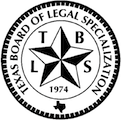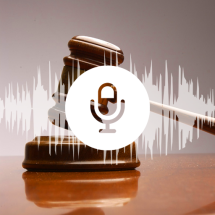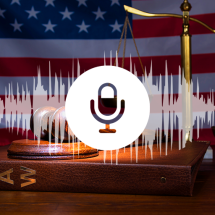Texas Evading Arrest Attorney
When a police officer initiates a traffic stop where an individual is in a vehicle, you must stop. Often, people inadvertently do not see the police lights or hear sirens, possibly because they are playing music loud, texting, or are distracted in some other form of fashion. If you are charged with evading arrest in Texas, whether it is alleged to be in a vehicle or on foot, you need the assistance of an experienced criminal defense attorney to help contest the charge.
Attempting to elude or escape from a situation or a scene of the crime is always never a good idea if it is done purposefully and with intent, the result and consequences of which can be quite harmful. There are some specified laws related to evading arrest in Texas and accordingly if the state is able to prove each element of the offense (usually if it is alleged one tried to intentionally evade arrest) and a conviction ultimately results, a person may have to face severe consequences. Evading arrest is always a serious charge, it is of the utmost importance to contact an experienced, trained, and skilled criminal defense attorney to help defend against these charges.
The Texas Penal Code defines the offense, generally speaking of evading arrest in the following manner: “a person commits the offense of evading arrest or detention if the person “intentionally flees from an individual the person (or the defendant) knows is a peace officer attempting to lawfully arrest or detain them.” The consequences and degree of offense differ according to different and varying factors attributed to the alleged incident, including whether it was alleged to be in a vehicle (which is a felony), on foot (which can be a misdemeanor), and whether or not someone was injured during the incident.
Evading Arrest – Texas
Pursuant to Section 38.04 of the Texas Penal Code, Evading Arrest or Detention is defined specifically as follows:
(a) A person commits an offense if he intentionally flees from a person he knows is a peace officer or federal special investigator attempting lawfully to arrest or detain him.
(b) An offense under this section is a Class A misdemeanor, except that the offense is:
(1) a state jail felony if:
(A) the actor has been previously convicted under this section; or
(B) the actor uses a vehicle or watercraft while the actor is in flight and the actor has not been previously convicted under this section;
(2) a felony of the third degree if:
(A) the actor uses a vehicle or watercraft while the actor is in flight and the actor has been previously convicted under this section; or
(B) another suffers serious bodily injury as a direct result of an attempt by the officer or investigator from whom the actor is fleeing to apprehend the actor while the actor is in flight; or
(3) a felony of the second degree if another suffers death as a direct result of an attempt by the officer or investigator from whom the actor is fleeing to apprehend the actor while the actor is in flight.
(b) An offense under this section is a Class A misdemeanor, except that the offense is:
(1) a state jail felony if the actor has been previously convicted under this section;
(2) a felony of the third degree if:
(A) the actor uses a vehicle while the actor is in flight;
(B) another suffers serious bodily injury as a direct result of an attempt by the officer from whom the actor is fleeing to apprehend the actor while the actor is in flight; or
(C) the actor uses a tire deflation device against the officer while the actor is in flight; or
(3) a felony of the second degree if:
(A) another suffers death as a direct result of an attempt by the officer from whom the actor is fleeing to apprehend the actor while the actor is in flight; or
(B) another suffers serious bodily injury as a direct result of the actors use of a tire deflation device while the actor is in flight.
In Texas, if a person intentionally attempts to flee from a crime scene or from an approaching police officer who is attempting to initiate a detention or an arrest, they will be likely be charged with evading arrest. Regardless, a person is not legally entitled to purposefully hide or free from the scene of a possible crime, even if they are scared, frightened or confused.
The reasoning behind this is our laws recognize that citizens should be forced to yield and not attempt to flee, hide, or in any other way avoid being arrested by a police officer or someone in a position of authority (such as a federal agent, a plain clothes police officer, etc.). A person will likely be charged with evading arrest if they perform any of the following actions, in whole or in part of intentionally trying to “avoid a situation of arrest by escaping or fleeing from the crime scene or from the government officer.”
In Texas, the foundation for this offense is rooted in how legally our laws require every individual must obey the authority of laws and officials when they are attempting to detain or arrest a person for some investigation.
Possible Punishment for Evading Arrest
The severity of punishment for the crime of evading arrest differs according to the facts alleged. Possible punishments in Texas can possibly include the following:
- If there was no use of a vehicle, and it was strictly on foot, then the charge will likely be filed as a class A misdemeanor offense, which has a potential range of punishment of a possible jail sentence of up to one year in a county jail, and a fine not to exceed $4,000.
- If it is alleged there was the use of vehicle during the process of an individual evading arrest, then the charge will likely be classified as a state jail felony offense, which has a potential range of punishment of not less than 180 days but not more than 2 years in a state jail facility, , and maximum fine not to exceed $10,000.
- If it is alleged there was use of a vehicle and the involvement of the third party, it will be classified as a third-degree felony, which has a potential range of punishment of not less than 2 years but no more than10 years in the Texas Department of Corrections (“TDC” or prison), and maximum fine not to exceed $10,000.
- If it is alleged that another suffers serious bodily injury as a direct result of an attempt by the officer from whom the actor is fleeing to apprehend the actor while the actor is in flight, it will be classified as a third-degree felony, which has a potential range of punishment of not less than 2 years but no more than10 years in the Texas Department of Corrections (“TDC” or prison), and maximum fine not to exceed $10,000.
- If it is alleged that someone is killed during the process of attempting to evading arrest, it will likely be charged as a second-degree felony, which has a potential range of punishment of not less than 2 years, but no more than10 years, in the Texas Department of Corrections (“TDC” or prison), and maximum fine not to exceed $10,000.
What Must the State prove?
Being charged with the criminal offense in Texas of evading arrest from the police or other authorities is something that can occur when the facts dictate, however, it is quite another thing for the state to be able to prove all of the elements of the offense “Beyond a Reasonable Doubt” to obtain a conviction. A conviction can only occur if the State proves “Beyond a Reasonable Doubt” that a person is legally guilty of the crime as alleged. To establish beyond a reasonable doubt to convict someone for evading arrest in Texas, there has to be sufficient evidence that an individual: 1) intentionally planned to prevent an arrest or a lawful detention; and 2) an individual actually did something that arises to the level where they have done an overt act which might have led to arrest or detention.
*Intent to Evade Arrest – The state will need to prove actual intent specific to you that you attempted to evade law enforcement/police officer for detention or arrest. In theory, making a mistake or not noticing a police officer, even if it seems obvious, would not be sufficient to convict you. Some people are simply absent-minded, and get lost in thought – and may not realize or notice something that would otherwise seem obvious.
*Arrest/Detention had to be valid/lawful – The state must prove that your arrest or detention was valid and made under proper legal pretenses. If you were only charged with evading arrest, and nothing else – it would seem that there would be no reason for a person to attempt to evade an arrest. More specifically, if one wasn’t in the process of committing another crime, in other words, where is the motive to evade arrest? Logic dictates it may not make sense, and the overt act may have been something inadvertent.
What are some possible defenses to the charge of Evading Arrest?
As with any criminal case and mounting a successful defense depends upon the unique facts and circumstances attributed to the incident. Some pertinent or relevant facts may include:
- Was there sufficient probable cause or reasonable suspicion that a criminal offense, even a traffic violation, was actually committed prior to the law enforcement encounter?
- Did the law enforcement or authority figure use clear sounds indicating they were attempting to make a detention or an arrest, such as the use of sirens, strobe lights, were the sirens audible, how loud, did they use a loudspeaker from their squad car, or anything else as a gesture to indicate their intention to effectuate the detention or an arrest (such as a traffic stop).
- Exactly how much space or distance was covered between when they tried to initiate the arrest or detention and when a person eventually did pull over or submit to the authority?
- If there was no other arrest made (such as possession of an illicit drug), what was the motive to allude or attempt to evade the arrest?
- How fast was your vehicle traveling (if in a car) prior to and during the pursuit before contact?
- Were there any conditions that would have made the situation one where a person was distracted or was the reason why the person did not immediately react to the show of authority (such as weather conditions, traffic on the road, possible health or medical conditions, such as a person being unable to hear)
- What reason was given by the police officer for the reason for the detention or why they attempted to effectuate an arrest?
- Was the roadway one where it possibly made it hard or impracticable for a person to stop (such as if a police officer initiates a traffic stop on a busy highway with nowhere for a person to pull over).
Other scenarios which may exist that could be presented as a viable defense could include facts such as:
- The police officer/authority figure did not clearly identify themselves properly or in a manner that would make it obvious who they were and what they were attempting to do. For example, a police officer working in plain clothes, or driving an unmarked vehicle that is not obvious it is a police car – then it is possible an individual was not sure what was happening, or who the person was. If someone does not know for sure they are dealing with a police officer or someone in position of authority (such as a federal agent), then it is possible that they may not have known who they were dealing with, what the purpose was – and thus, had no intention of trying to evade or elude an arrest or detention.
- The attempt for a detention on the street (it clearly was not a consensual encounter), or in a vehicle for a traffic stop, and/or the ultimate arrest was not made in a lawful manner. It would seem more credible, for example, if a person who is driving in a vehicle has outstanding warrants for their arrest (a la O.J. Simpson), or a situation where a person had illegal drugs in their vehicle, or perhaps were afraid of being arrest for Driving While Intoxicated, for a person to have the motive to attempt to evade arrest. However, if there was no reason for the contact, or it was based on something not credible or actual, then the act of evading arrest is not credible. There usually is an underlying reason or motive behind why someone would attempt to evade an arrest or detention, such as a supplemental charge, to clearly indicate the actual intent behind the police officer’s attempt to effectuate an arrest.
- The evasion was inadvertent, based on a mistaken belief, or the communicate was not clear between the police officer’s intent at communicating how they intended to detain or effectuate an arrest, or possibly even based on a simple misunderstanding. I personally handled a case once where the patrol vehicles for a specific police agency looked almost identical to several different city EMS/Emergency vehicles in the DFW Metroplex. On the video – the first thing my client said was “I thought you were an ambulance.” I had an investigator take pictures of comparable EMS/Emergency vehicles and showed how similar they were to the patrol vehicle of this agency. The DA trying this case tried very hard to keep these photos of the vehicles taken by the investigator to not be admitted as evidence for the jury to consider. Ultimately, when the Judge ruled they were relevant and they were all entered as a piece of evidence, the jury looked directly at the DA trying to keep the pictures out, as if it to say, “why were you trying to keep this information from us.” The jury returned a verdict of “Not Guilty” in less than 10 minutes. In other words, if an individual simply fails to recognize a police vehicle behind them, or does not hear audible sirens because they were playing music loudly – then it is reasonable to conclude what was construed as an attempt to evade an arrest, was actually the result of a simple misunderstanding, inadvertence to surroundings, being absent-minded, being distracted, etc. If this is indeed the case, the State would have a difficult time proving an essential element of the crime for proving intent, and the case possibly would be a difficult one to persuade a jury at trial to convict.
Contact Us Now
Carl David Ceder, the DFW Defender, is a reputable, experienced, and skilled criminal defense lawyer who practices in the Dallas-Fort Worth Metroplex, and has the resources, experience, and insight to help try and mount a successful defense and to assist with your case. Experience matters, especially when you are faced with having to try and successfully navigate through our criminal justice legal system, which can be frightening, confusing, and complex. Contact Carl David Ceder today to discuss your case if you have been charged with an offense of evading arrest. Carl has vast experience handling criminal cases all over the State of Texas with a great amount of success. Please call 214.702.CARL(2275) or 469.2000.DWI(394) for a free consultation on what your defenses may be to contest your charge of evading arrest.
Carl David Ceder, the DFW Defender, devotes a vast amount of resources, training, and experience to defend against any criminal defense charge. The Law Offices of Carl David Ceder has years of proven experience and a reputation earned in the courtroom for successful results. Attorney Carl David Ceder is Board certified in Criminal Law by the Texas Board of Legal Specialization and is committed to defending your charge of evading arrest and detention (and/or any type of criminal charge) that may accompany it. Contact Carl David Ceder, the DFW Defender, at [email protected], or by calling 214.702.CARL(2275) or 469.2000.DWI(394) today to discuss the specific circumstances of your case.





















